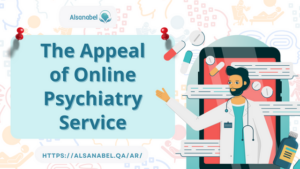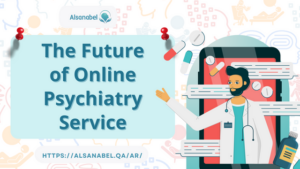Exploring the Benefits of Online Psychiatry Apps 2024
- Category Online Psychiatry
This article highlights the emergence of online psychiatry apps as a promising solution in today’s fast-paced world where time is limited and access to mental health services can be challenging. These digital platforms offer therapy sessions, counseling, and psychiatric support directly through smartphones or computers, revolutionizing mental healthcare access. The article explores the reasons for their popularity, the efficacy of virtual therapy sessions, and the challenges and opportunities they present for users and mental health professionals. Overall, online psychiatry apps are reshaping mental healthcare, empowering individuals to prioritize their mental wellness like never before.
The Appeal of Online Psychiatry Service
The appeal of online psychiatry services stems from several key factors that resonate with individuals seeking mental health support:

- Convenience: Whether at home, work, or traveling, users can schedule appointments that fit into their busy schedules without the need to commute to a physical office.
- Accessibility: Online psychiatry services break down these barriers, providing access to mental health support to a wider audience, including those in remote or underserved areas.
- Privacy and Anonymity: The anonymity provided by online psychiatry services can reduce feelings of shame or stigma associated with seeking mental health support, encouraging more people to reach out for help.
- Choice and Customization: Online psychiatry services often offer a diverse range of therapists with various specialties and backgrounds. Additionally, users can often select their preferred mode of communication providing a level of customization and flexibility in the therapeutic process.
- Affordability: Often offer more affordable pricing options compared to traditional in-person therapy. Subscription-based models, sliding scale fees, and insurance coverage options make mental healthcare more financially accessible to a broader population.
- Immediate Support: Many platforms offer 24/7 access to licensed mental health professionals, allowing individuals to receive timely assistance when they need it most.
- Technological Advancements: Secure video conferencing platforms, encrypted messaging systems, and user-friendly interfaces ensure the confidentiality and security of online therapy sessions, building trust and confidence in the platform.
Overall, the appeal of online psychiatry services lies in their ability to provide convenient, accessible, and personalized mental health support to individuals in need, ultimately helping to break down barriers to care and improve overall well-being.
Exploring the Efficacy of Telehealth Psychiatrist
Telehealth psychiatry’s efficacy stems from various factors:
- Clinical Outcomes: Research indicates comparable effectiveness in treating mental health conditions to traditional therapy.
- Patient Satisfaction: Convenience, accessibility, and reduced stigma contribute to high patient satisfaction.
- Accessibility: Overcomes barriers like geographical distance and mobility limitations, improving access to care.
- Continuity of Care: Enables regular appointments despite relocation or travel, ensuring consistent support.
- Cost-effectiveness: Reduces overhead costs and offers affordable options, enhancing accessibility.
- Adaptability and Flexibility: Flexible scheduling accommodates diverse needs, improving accessibility.
- Provider Satisfaction: Offers benefits like scheduling flexibility, but technological challenges may affect satisfaction.
Overall, telehealth psychiatry shows promise in delivering high-quality mental healthcare, supported by positive outcomes, patient satisfaction, accessibility, and cost-effectiveness. Further research will optimize its effectiveness.
Bridging Gaps through Telehealth Psychiatrist
Telehealth psychiatrist acts as a crucial link, addressing geographical, logistical, and social barriers to mental healthcare:
- Geographical Accessibility: It connects patients with mental health professionals irrespective of location, benefiting those in rural or underserved areas where access to psychiatrists is limited.
- Logistical Convenience: By removing time-consuming commutes and scheduling conflicts, it encourages more frequent therapy engagement from the comfort of patients’ homes, reducing missed appointments.
- Reducing Stigma: Telehealth offers privacy and anonymity, easing fears of judgment and stigma associated with seeking help, particularly for marginalized populations.
- Improved Continuity of Care: It enables regular check-ins and follow-ups, fostering ongoing relationships between patients and providers, crucial for better treatment outcomes, especially for chronic conditions.
- Enhanced Access to Specialists: Telehealth connects patients with specialized care regardless of location, valuable for complex cases or access to experts.
- Crisis Intervention and Support: It provides timely intervention during crises through video calls or messaging, potentially preventing harm and offering immediate assistance.
- Scalability and Flexibility: Telehealth offers scalability and adaptability in delivering mental healthcare, especially crucial during emergencies or disruptions, ensuring continued support.
Overall, telehealth psychiatry serves as a vital tool, offering accessible, convenient, and effective mental health support, transcending barriers of location and circumstance.
Navigating the Landscape of Online Psychiatry Platforms
Navigating online psychiatry platforms can be overwhelming, but considering key factors can help find the right fit:
- Provider Qualifications: Look for licensed and experienced professionals with relevant credentials and specialties.
- Therapy Modalities: Choose platforms offering your preferred communication method, whether video calls, phone calls, or messaging.
- Treatment Offerings: Ensure the platform provides the services you need, from therapy to medication management, tailored to your mental health concerns.
- Cost and Insurance: Understand pricing, subscription plans, and insurance coverage, prioritizing platforms with transparent costs and insurance acceptance.
- Security and Privacy: Opt for platforms with strong security measures, encryption, and HIPAA compliance to safeguard your privacy.
- User Experience: Seek intuitive design, easy scheduling, and responsive customer support for a seamless experience.
- Reviews and Testimonials: Research user feedback to assess therapist quality and overall satisfaction.
- Regulatory Compliance: Verify compliance with local regulations and therapist licensing in your area.
- Accessibility and Availability: Ensure timely access to care with flexible appointment options and responsive support.
- Additional Features: Explore extra resources like self-help tools or community forums to enhance your treatment journey.
Considering these factors will empower informed decisions and help find an online psychiatry platform that suits your needs and preferences.
The Future of Online Psychiatry Service
The future of online psychiatry services shows promise, driven by several key trends:

- Expansion of Services: Beyond traditional therapy, services may include integrative approaches like mindfulness training and group therapy, tailored to specific mental health conditions.
- Personalization through AI: AI and machine learning will personalize treatment plans, analyzing data to offer targeted interventions tailored to individual needs.
- Enhanced Accessibility: Efforts will focus on reaching underserved populations, with subsidized or free services, community partnerships, and culturally competent resources.
- Integration with Wearable Technology: Wearable devices could monitor mental health indicators in real-time, enabling early intervention and preventive care.
- Virtual Reality Therapy: VR therapy offers immersive interventions for anxiety, stress, and trauma, likely to become more prevalent as VR technology advances.
- Telepsychiatry Regulations and Standards: Regulatory bodies will establish clearer guidelines for licensure, accreditation, and patient confidentiality in online mental health services.
- Research and Evidence-Based Practices: Ongoing research will build evidence for the efficacy of online psychiatry, informing best practices and advancing the field.
Collaboration among stakeholders will be critical in realizing the full potential of online psychiatry in improving mental well-being globally.









